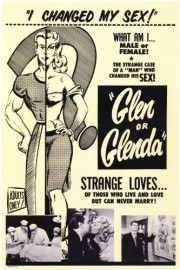Glen or Glenda?
Ed Wood’s “Glen or Glenda?” tells the story of a crossdresser in search of his identity in 1950s America, but what viewers will likely remember most is Bela Lugosi, the aging icon of horror, as a mad scientist of sorts whose dialogue borders on the surreal. Like his hero, Orson Welles, Wood set out to make a masterpiece. Unfortunately, Wood was not Welles, and his first film would become famous on the other end of the creative scale.
Because of his infamy after his death in 1978, and especially as a result of Tim Burton’s Oscar-winning film on the director, we know much more about Edward D. Wood, who otherwise would have likely fallen into obscurity like other auteurs of the awful in film history. Or would he have? Wood’s films transcend their terrible production values. They are the work of a man with a singular artistic vision, although he lacked the financial backing, and one could very easily say the talent, to achieve the success of filmmakers like Welles and Hitchcock. His films must be seen to be believed.
Made in 1953 in four days, “Glen or Glenda?” was the most personal film for Wood, and without question, his worst. The film is just too bizarre, from the absurd superimposition of stock footage to the scenes of Lugosi looking straight into the camera, saying, “Pull the strings! Pull the strings!” As for the central story, Ed Wood himself stars as Glen, a man who has always liked to dress up in women’s clothing. He’s not gay, but he feels like himself dressed in angora and female undergarments. Wood’s girlfriend at the time, Dolores Fuller, plays Glen’s longtime girlfriend, Barbara, who knows nothing of Glen’s obsession. They get engaged, but the struggle about telling Barbara begins long before that. Can she accept him, or will he be like his friend (whose transvestism broke up his marriage), or like the man who had just killed himself because he couldn’t live with his shame anymore? Or, will he find that becoming a woman in body is the best answer? I’ll allow Wood’s film to answer those questions.
Seriously, this is one messed up movie. There are visions of S&M and a marriage witnessed by the devil. There are stilted line readings and crazy cutaways. There’s Bela Lugosi’s commitment to his character, which just adds one more level of crazy to the film’s 68-minutes. And yet, it’s likely that if Wood had made a more subdued, and “normal,” film on the subject, the film would have been easily forgotten. 58 years later, “Glen or Glenda?” remains. It’s not a shining example of artistic achievement, but it is a film that, once seen, is never forgotten, even if it’s for many of the wrong reasons.










